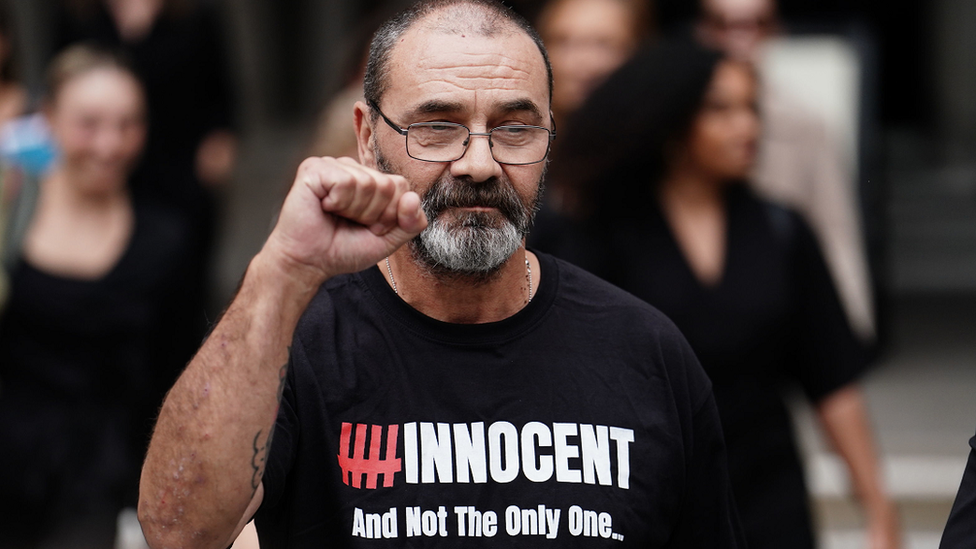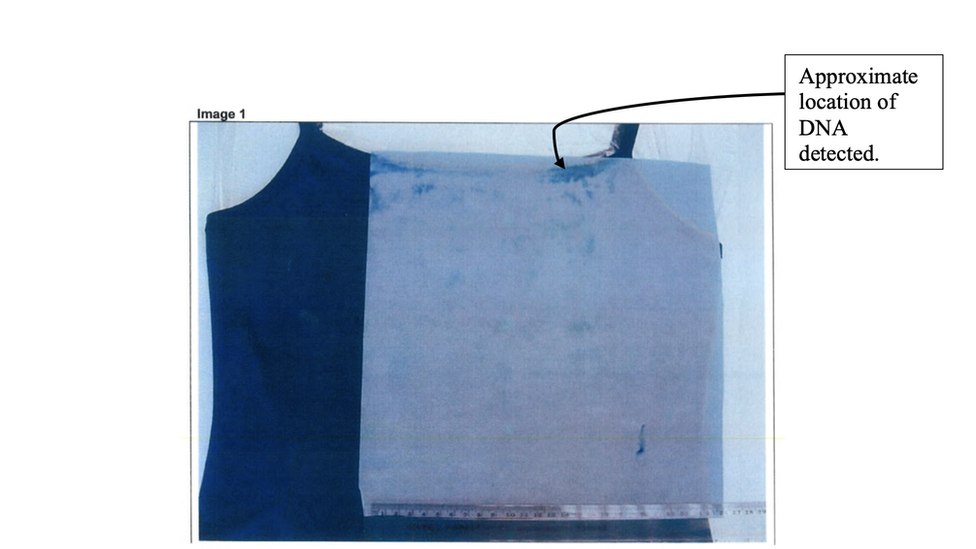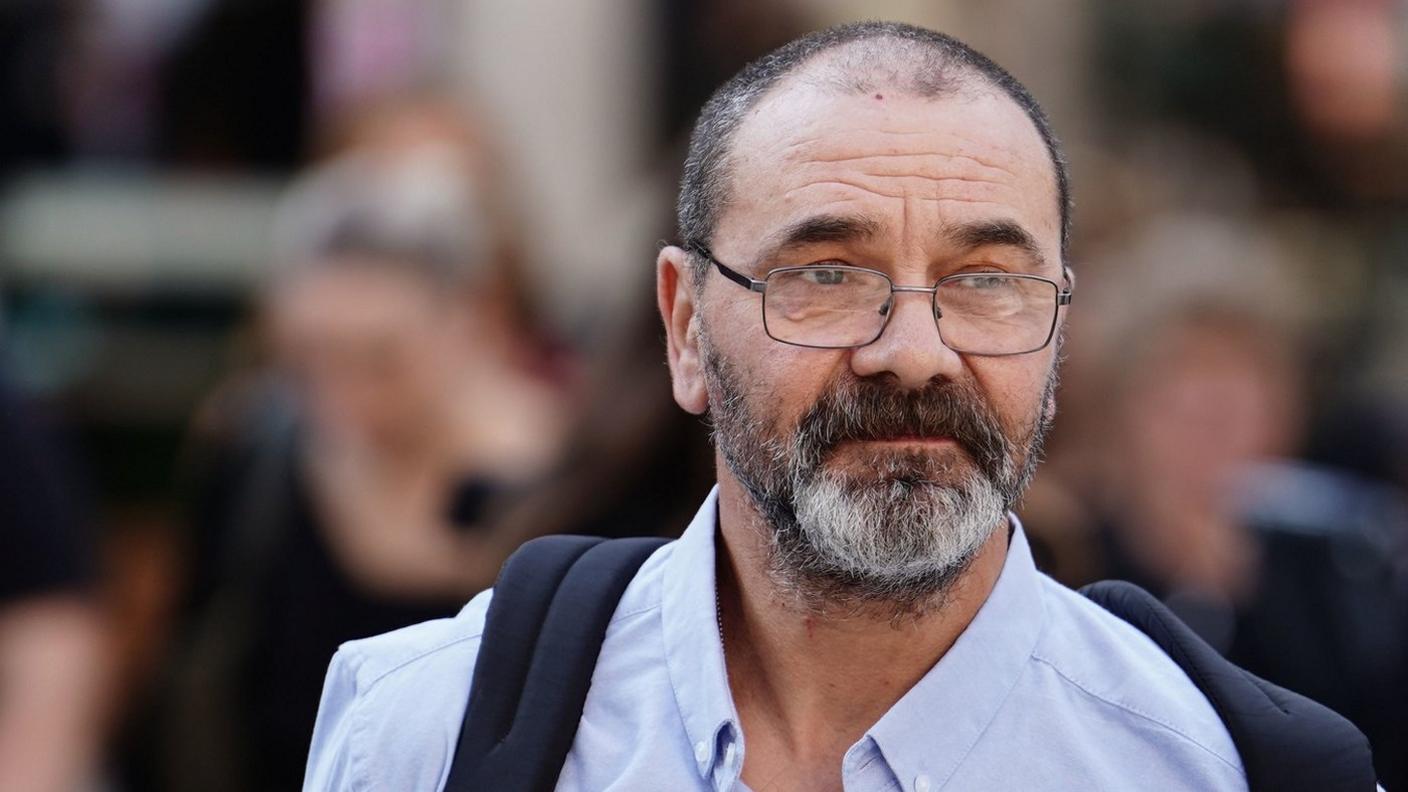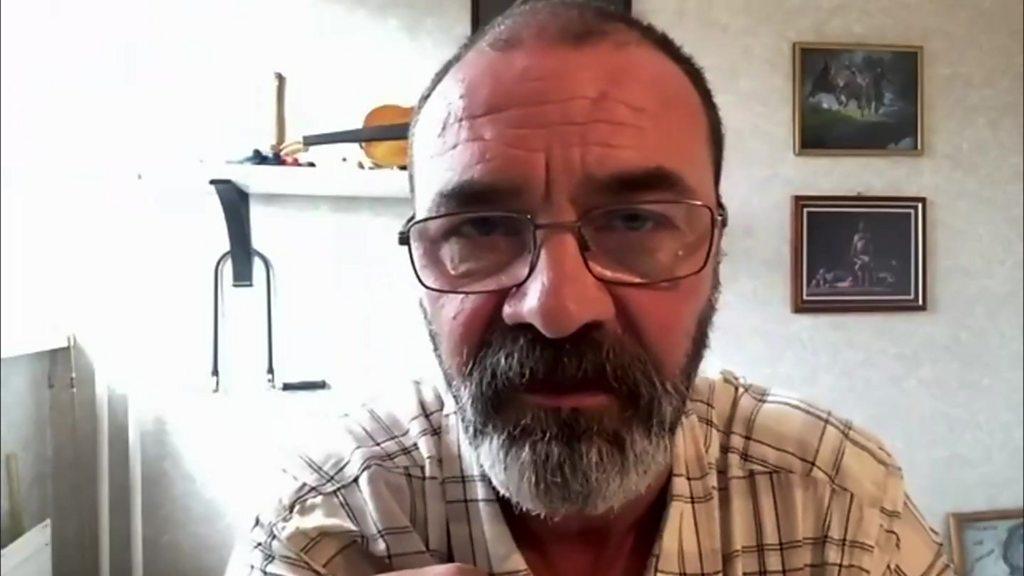Andy Malkinson: DNA evidence identified three years after rape conviction
- Published

Andy Malkinson was wrongfully convicted of raping a woman in Greater Manchester in 2004
Documents in the case of Andy Malkinson show the DNA of another man was identified three years after he was wrongly jailed for rape.
Mr Malkinson was found guilty in 2004 of raping a woman in Greater Manchester and only had his conviction quashed last month at the Court of Appeal.
Questions have now been raised over why Mr Malkinson was not granted an appeal as long ago as 2009.
The Criminal Cases Review Commission failed to follow leads, he said.
Mr Malkinson went to prison protesting his innocence. At his trial there had been no DNA or other forensic evidence to link him to the victim, or the scene of the savage attack.
Last month, the Court of Appeal quashed the 57-year-old's conviction after the Crown Prosecution Service accepted that DNA obtained long ago from the victim's clothing - but never fully and repeatedly tested for matches - pointed to another man.
Case documents seen by BBC News show that all the key agencies involved in Andy Malkinson's case knew by 2009 of this exonerating DNA.
Mr Malkinson's team argue the DNA evidence would have been more than enough to quash his conviction, even if the real suspect could not be identified.
Cold case review
In 2007, forensic scientists had run a nationwide operation to review biological samples from "cold case" unsolved crimes in the hope that technical advances in DNA profiling could identify more suspects.
In Andy Malkinson's case, the scientists tested for new DNA from the victim's clothing - and the results triggered new questions.
Documents now disclosed to Mr Malkinson show that in December 2009, the scientists told Crown Prosecution Service lawyers and Greater Manchester Police detectives they were sure they had identified DNA from an unknown man's saliva.
Between 2007 and 2009 the scientists carried out two searches on the National DNA Database for a match to known suspects. Those searches did not yield a match to any man - a result that also further underlined the sample could not have come from Mr Malkinson.
The team told the CPS and GMP that the DNA had been recovered from the victim's vest, close to where she had suffered a very serious bite wound.

DNA from an unknown man's saliva was found on the victim's vest top.
A senior CPS lawyer wrote in his notes: "If it is assumed that the saliva came from the offender, then it does not derive from Malkinson.
"This is surprising because the area of the clothing that the saliva was recovered from was crime-specific."
Despite recognition in the meeting that the DNA evidence appeared to point to another man having attacked the woman, the Crown Prosecution Service advised against any more work on the case, unless and until Mr Malkinson was granted permission for a fresh appeal.
Mr Malkinson had already begun that process by asking the Criminal Cases Review Commission (CCRC) to reinvestigate and send his conviction back to the Court of Appeal.
His then lawyers were told about the new DNA work - and urged the CCRC to undertake a "full and comprehensive review of the forensic evidence".
But the agency's case log shows its investigators then concluded there was "nothing to be gained" by having any of the DNA retested.
The file, disclosed to Mr Malkinson, notes: "Would [testing] be a good use of public funds? I do not think on the basis of the material available that it would be a reasonable course of action."
A CCRC investigator later wrote that there was "no DNA material to speak of" and further testing "would be extremely costly".
The file goes on to question whether the location where the new DNA profile had been found was significant at all.
"There is no certainty that the vest top DNA sample is crime specific," wrote a CCRC investigator.
Greater Manchester Police later destroyed the victim's clothes - and the 2007 DNA profile lay buried in a scientific archive until Mr Malkinson's new legal team tracked it down and commissioned their own testing in 2019.
That work ultimately led to the identification of a different man whose profile had, in the meantime, been added to the National DNA Database.
Call for apology
Since Mr Malkinson won his freedom, more than 100,000 people have signed his petition for an independent review of how the CCRC handled the case.
"If the CCRC had investigated properly, it would have spared me years in prison for a crime I did not commit," said Mr Malkinson.
"I feel an apology is the least I am owed, but it seems like the very body set up to address the system's fallibility is labouring under the delusion that it is itself infallible. How many more people has it failed?"
Lord Edward Garnier, Conservative peer and former solicitor general, expressed his "jaw-dropping shock" over the handling of Mr Malkinson's case.
"The more one learns about this case, which is coming out in dribs and drabs, the more one is shocked about how Mr Malkinson was let down by the justice system, essentially let down by the state," Lord Garnier told BBC Radio 4's Today programme.
He called for a public inquiry reaching conclusions within six months, and said all documents related to the case should be publicly disclosed.
"It's particularly distressing to hear that on grounds of cost, they [the CCRC] decided this was not worth pursuing. Well, here we are now in 2023, well over a decade since they were first involved in this matter, and the costs now are enormous.
"Not only have we had the cost to Mr Malkinson in every sense of the word, but we are going to see him paid justly huge amounts of compensation. I'd be very surprised now if somebody didn't say he should be given exemplary damages, not just compensatory damages, because of the oppressive and arbitrary behaviour of agents of the state," he said.
Exemplary damages are assessed to punish the defendant for the wrongful act and "overcompensate" the victim.
Senior Conservative and former justice secretary Sir Robert Buckland backed Lord Garnier's call for a public inquiry.
"I agree with Lord Garnier. Clearly this latest revelation is startling to say the least", he told BBC Radio 4's World at One. "That's why I think we need to get to the bottom of this."
James Burley, the investigator at APPEAL, the miscarriages of justice charity that took on Mr Malkinson's case, said the CCRC's decision-making had been "deeply flawed".
"If the CCRC had applied common sense, it would have granted Andy a new appeal in 2009," said Mr Burley.
"Instead, the CCRC said this evidence wasn't enough and then failed to carry out DNA enquiries which might not only have further supported Andy's innocence but identified the new suspect years sooner."
In a statement to the Guardian newspaper, the CCRC said: "We note the observations that have been made in relation to Mr Malkinson's case and are considering the court of appeal judgment. As we have said before, it is plainly wrong that a man spent 17 years in prison for a crime he did not commit." The organisation has not responded to BBC News' request for an interview.
In a statement, Assistant Chief Constable Sarah Jackson of Greater Manchester Police said that, when the force became aware of the new DNA material, it complied with all directions given to it by the Criminal Cases Review Commission.
"This was an appalling miscarriage of justice and I am sorry to Mr Malkinson for all that he has suffered, and for any part GMP has had in the difficult journey of proving his innocence," she said.
The Independent Office for Police Conduct is reviewing how Greater Manchester Police dealt with Mr Malkinson's complaints about his case. Last month the Court of Appeal ruled that two people who police relied upon as alleged witnesses, placing the innocent man at the scene of the crime, were in fact petty criminals. The judges said the jury should have been made aware of their dishonesty.
A spokesman for the CPS said it shared the "deep regret" that Mr Malkinson had been wrongly convicted - but denied the 2007 DNA evidence had been ignored.
"It was disclosed [in 2009] to the defence team representing Mr Malkinson for their consideration," he said.
"In addition, searches of the DNA databases were conducted to identify any other possible suspects. At that time there were no matches and therefore no further investigation could be carried out."

Sign up for our morning newsletter and get BBC News in your inbox.

Related topics
- Published7 August 2023

- Published6 August 2023
